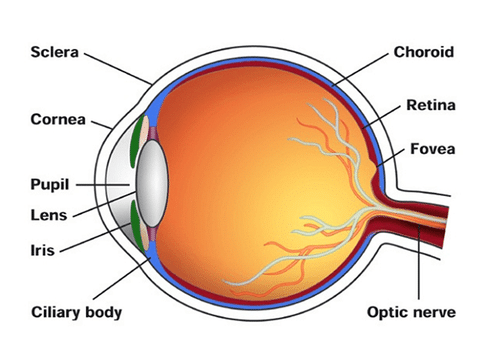What Is Inside Our Eyes?
Key Notes :

- Introduction to the Eye:
- The eye is a complex organ that allows us to see and perceive the world around us.
- It is one of our most important sensory organs.
- Eye Structure:
- The eye has several layers, including the cornea, sclera, iris, pupil, lens, retina, and optic nerve.
- Cornea:
- The cornea is the clear outermost layer of the eye.
- It helps focus light onto the retina.
- Iris and Pupil:
- The iris is the colored part of the eye.
- The pupil is the black center of the iris.
- The iris controls the size of the pupil, regulating the amount of light that enters the eye.
- Lens:
- The lens is a transparent structure located behind the pupil.
- It focuses light onto the retina by changing its shape.
- Retina:
- The retina is a light-sensitive layer at the back of the eye.
- It contains photoreceptor cells called rods and cones that capture light and send signals to the brain.
- Rods and Cones:
- Rods are responsible for low-light vision and detecting motion.
- Cones are responsible for color vision and visual acuity.
- Optic Nerve:
- The optic nerve carries visual information from the retina to the brain.
- The brain processes this information, allowing us to perceive images.
- Aqueous and Vitreous Humor:
- The eye contains two types of transparent fluids: aqueous humor (in the front) and vitreous humor (in the back).
- These fluids help maintain the eye’s shape and provide nutrients to its structures.
- Functions of the Eye:
- The main function of the eye is to capture and process light to create visual images.
- It plays a crucial role in our ability to perceive and interact with the world.
- Common Eye Problems:
- Myopia (nearsightedness) and hyperopia (farsightedness) are common refractive errors.
- Cataracts involve the clouding of the eye’s lens.
- Glaucoma is a condition related to increased intraocular pressure.
- Age-related macular degeneration affects the central part of the retina.
- Eye Care and Protection:
- Protecting the eyes from injuries and harmful UV rays is important.
- Regular eye check-ups can detect and address vision problems early.
- Conclusion:
- Our eyes are remarkable organs that enable us to see the world in all its beauty.
- Understanding their structure and function is essential for maintaining good eye health.
Let’s practice!

